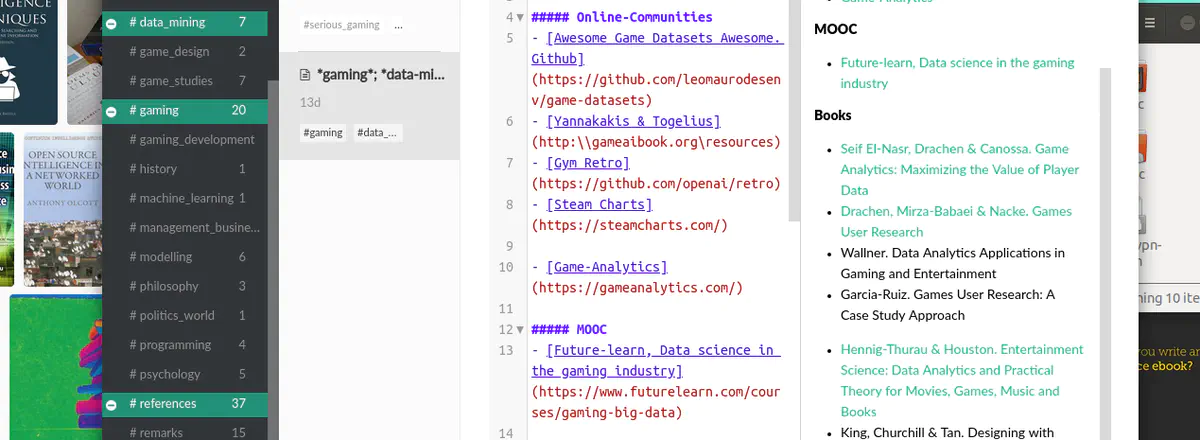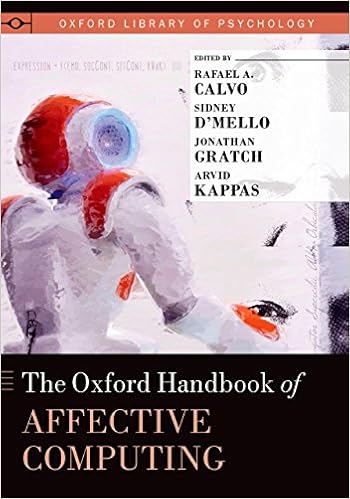My Selected Books List
Affective Computing, Data-Analytics, Video-Games and Digital-Librety
 A Screenshot of my note-taking app
A Screenshot of my note-taking app
Introduction
I present selected books spanning data-science, affective-computing, and video-games. Online-communities are fruitful of programming-related books, But I found no clue of books which show you comperhensive view of the state of art so that you could develop novel techniques. Hence, came the motivation of my selections. The following texts act as a high-level road-map and jumping-off headlines for further study. So, Do not expect to understand everything but rather to explore new topics you had not heard of before. Another aim is to bridge the gap between research and industry, As you shall see a combination of theory, engineering and business. The texts are not beginner friendly and assume background on behalf of the reader. Finally, Swartz book might seem irrelevant, but I believe ethical issues must accompany any mention of data-science.
Table of Contents
- Introduction
- The Oxford Handbook of Affective Computing
- Game Analytics: Maximizing the Value of Player Data
- Data Science Thinking: The Next Scientific, Technological and Economic Revolution
- The Boy Who Could Change The World: The Writing of Aaron Swartz
- Emotion in Games
- The Nature of Emotion: Fundamental Questions
- Artificial Intelligence and Games
The Oxford Handbook of Affective Computing

If there is one book you would obtain from this blog, then certainly I would recommend you Oxford’s Handbook of Affective Computing as it is the most modern text which combines theory, engineering, and applications within the framework of emotions. Its content includes cognition, psychology and neuroscience theories; software recommendations; ethical issues; applications alike video-games, virtual reality, robotics and autonomous agents. In addition, it contains an excellent facial recognition survey, the most common approach wihtin the affective computing community.
Game Analytics: Maximizing the Value of Player Data

Isn’t data-analytics the same across all domains? In fact, One of the fundamental pillars of a successfull data-science project is understanding the specific domain expertise in which data are applied. This book presents interviews and case studies from the gaming industry including giants like Unity. I believe it is a good practice to wear someone else’s shoes to see the challenges he faced and approaches he took to overcome them. Alongside interviews, It contains excellent articles on modelling players behavior, studying and classifying them, and even personalising players groups with an adapted content! Most notably, Chapter 29, Designer, Analyst, Tinker: How Game Analytics will Contribute to Science, is one of the rare gems as it treats analytics in a degree of scientific rigor I had never seen anywhere else.
Data Science Thinking: The Next Scientific, Technological and Economic Revolution

I safely claim that reading that book distinguishes you from at least 95% of those who call themselves data scientists. The book has nothing to do with programming or math. It investigates two extremes within the spectrum of data science. On one hand, Philosophy of science like data science as a forth paradigm besides theory, experiment, and computation, and How data science contributes/benefits from other areas?. On the other hand, Business and economy disruption like data science potential on shaping industry, and Challenges facing data science.
The Boy Who Could Change The World: The Writing of Aaron Swartz

I still remember the day of SOPA’s controversial debate proliferating through social-media. Nearly, everyone had at least a comment about it. Particularly, The Internet’s Own Boy movie had a deep emotional influence on me. While I was a kid back then who had a shallow understanding of the scene, Aaron Swartz’ story was too special for me. The boy suicided aged 26 after being a landmark of SOPA initiative! I am not here to discuss politics justifying viewpoints as whether they are true or false, That would be a whole new blog post. But rather, I am mentioning his collected writings to emphasize his spirit, His enthusiasim about believing in libre platform in which the community could freely share and communicate his thoughts.
Emotion in Games

If you have already checked out game-related books about fun, Most probably, you would have embarked on naive books which tackles video-games from the tradational standpoint of verbal psychology. Eventhough we are still too far from a mature theory of fun or emotions whose applications would have an industrial interest, This special text is so far, the most rigor book I found about emotion in games.
The Nature of Emotion: Fundamental Questions

In the same manner the cognitive revolution of the 1960s spawned the linkage of various disciplines which examine cognition by different lenses, Affective science is an emerging hot area which seeks to bring together fields of interest to emotions like psychology, biology, computing, philosophy, and even social-sciences. While the field is still in its infancy, The Nature of Emotion: Fundamental Questions aspires to deliver a modern and accessible single book summarising all investigations related to emotions.
Artificial Intelligence and Games

Yannakakis and Togelius’s modern masterpiece. Whether you do gaming AI for science, or science for fun video-game design, this book is still targeting you. Its topics include modelling players, procedural content generation, and autonomous AI agents (NPCs). In addition to an excellent overview of traditional AI methods taught in introductory AI course, up to the recent trend of applying machine learning in gaming AI, The book is promosing to be the standard survey for both practitioners and academics. It shall be your first station to any problem related to the intersection of games and AI.